HOME >> CHINA
Regional naval code inked
Source:Global Times-Agencies Published: 2014-4-23 1:13:01
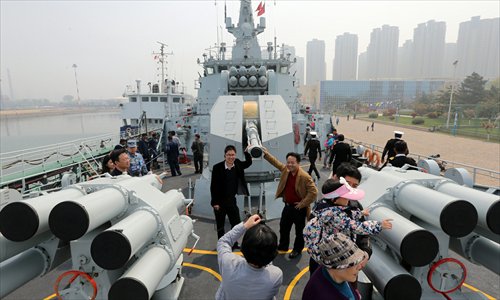
Visitors Tuesday take pictures on board a Pakistani frigate docked in Qingdao, Shandong Province, during an open day at the Western Pacific Naval Symposium. Photo: CFP
Member states of a regional naval symposium on Tuesday signed up to a framework maritime communication deal which is designed to reduce misunderstandings and avoid maritime accidents.
The agreement comes amid rising territorial frictions between China and its neighbors.
The agreement, the Code for Unalerted Encounters at Sea (CUES), was ratified at the Western Pacific Naval Symposium (WPNS) in Qingdao, East China's Shandong Province, which began Tuesday.
Based on international legal and navigation principles, it provides participants with a tactical maneuvering and signal manual to reduce interference and uncertainties during naval ship and aircraft encounters.
Xu Hongmeng, vice admiral in China's People's Liberation Army (PLA) navy, said the agreement would have a positive impact on maritime conduct, emphasizing that it was voluntary.
The code will further navy-to-navy exchanges between WPNS members, effectively control maritime crisis, and help avoid incidents of interference and collisions in international waters, said Zhang Junshe, research fellow with the Naval Military Studies Research Institute of the PLA.
Officers from other member countries spoke highly of CUES as an example of increasing naval cooperation between countries.
Martin Holzberger , warrant officer from the Royal Australian Navy, told the Global Times that CUES "will make them [operations] easier, increase the level of safety."
The document is not meant to directly address territorial disputes in the East and South China Seas, according to Reuters, citing officers from China and the US at the symposium.
But incidents in those waters have raised fears of an accidental clash, which could escalate into a broader conflict, the report added.
The US wants clearer operational communications with the growing Chinese fleet, arrangements in part hampered by different interpretations of what operations are acceptable in international waters, US naval officers have said.
In a separate agenda, participants also approved Pakistan as a WPNS observer at the symposium.
This is the first time China, one of its 12 founding members, has hosted the biennial symposium. The WPNS was established as proposed by the US and its allies in 1987 with the goal of promoting pragmatic cooperation between the navies of countries bordering the Pacific Ocean.
Delegates at the two-day event will review the work of WPNS-sponsored seminars and other activities for the past year and deliberate maritime regulations, among other discussions and exchanges.
Multi-country maritime exercises will be held off the coast of Qingdao from Tuesday to Wednesday to mark the 65th anniversary of the PLA navy.
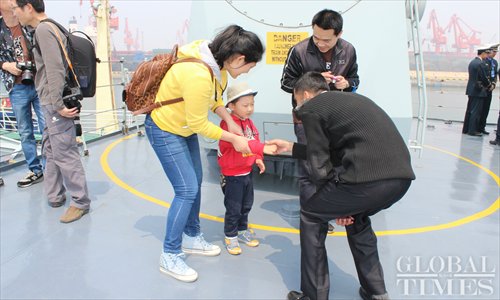
A boy shakes hands with a Pakistan sailor aboard the ship on April 22. Photo: Yu Jincui/GT
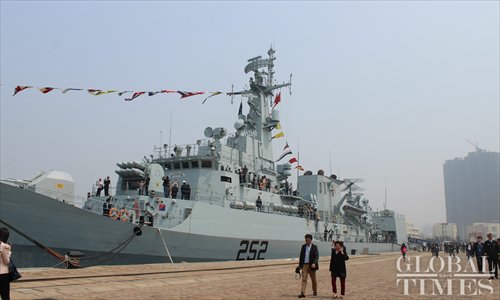
Pakistan naval ship Shamsheer is opened to the public in Qingdao, Shandong Province on April 22. Photo: Yu Jincui/GT
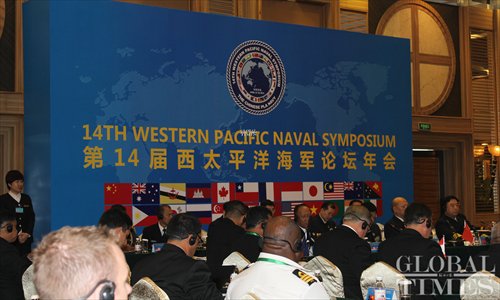
The 14th Western Pacific Naval Symposium gets underway in Qingdao, Shandong Province on April 22. Photo: Yu Jincui/GT
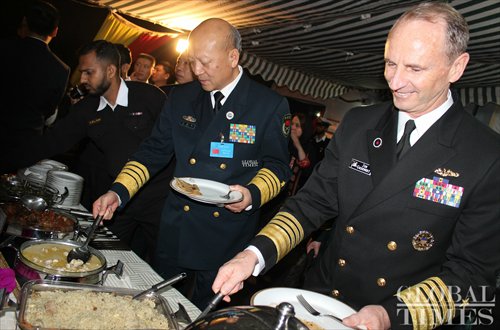
Chinese People’s Liberation Army Navy Commander Wu Shengli (middle) and US Chief of Naval Operations ADM Jonathan Greenert (right) attend a reception aboard a Pakistan naval ship in Qingdao, Shandong Province on April 22. Photo: Yu Jincui/GT
Posted in: Military